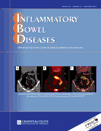Psychological treatment may reduce the need for healthcare in patients with Crohn's disease†
Results of the German prospective multicenter trial: Psychosocial Intervention in Crohn's Disease (“PICD”). The following institutions were partners in the study: Study coordinator: Department of Psychosomatic Medicine and Psychotherapy, Medical University Lübeck, H. Feiereis, G. Jantschek, F. Balck, J. von Wietersheim, Departments of Gastroenterology and Psychosomatic Medicine of the following universities: Charité Campus Benjamin Franklin, Department of Psychosomatics and Psychotherapy: H.H. Studt, H.-C. Deter, W. Keller, R. Dilg., Department of Gastroenterology: E.O. Riecken, M. Zeitz, M. Vallo-Wermes., Justus-Liebig-University Gieβen: Department of Psychosomatics: P. Möhring, E. Schmelz-Schumacher, W. Osborn. Department of Gastroenterology: H.-U. Klör, T. Linn, W. Doppl., Albert-Ludwigs-University Freiburg: Department of Psychosomatics and Psychotherapy: M. Wirsching, P. Scheib, K. Fritzsche, O. Rayki., Department of Gastroenterology: J. Rasenack, C. Spahmer, J. Schölmerich, Ruprecht-Karls-University Heidelberg: Institute of Medical Biometry and Informatics: M. Pritsch, S. Holzmeier.
Abstract
Background: Few published studies examine the influence of psychological treatment on health care utilization in Crohn's disease.
Methods: The present substudy of a prospective, randomized, multicenter trial conducted in 69 of 488 consecutive Crohn's disease (CD) patients was designed to investigate the way in which healthcare utilization is influenced by psychotherapy and relaxation in addition to standardized glucocorticoid therapy. Before and after a 1-year period of standardized somatic treatment the psychotherapy and control groups were compared with regard to hospital and sick-leave days. Predictors of healthcare utilization were analyzed.
Results: The comparison between groups before and after psychological treatment showed a significantly higher decrease of mean hospital days (P < 0.03) and sick-leave days in the treatment group compared with the controls. When a covariate analysis was applied to compare the data at randomization, the difference in hospital days remained statistically a trend (P < 0.1). Multivariate regression analysis detected a significant gender and depression effect for hospital days (cor r2 = 0.114) and a significant gender and age effect for sick-leave days (cor r2 = 0.112).
Conclusion: A significant drop in healthcare utilization after psychological treatment demonstrates a clear benefit of this additional therapy. This is important, since the study failed to demonstrate significant changes in the psychosocial status or somatic course of study patients. Clinical and psychological factors influencing these outcomes are discussed.
(Inflamm Bowel Dis 2007)




